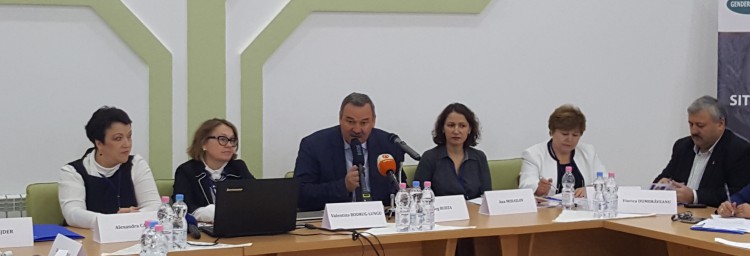Salaries at the edge of poverty: how can we improve the situation of workers in clothing sector
Workers in the clothing industry in the region, including Moldova, receive salaries at the edge of poverty and face poor working conditions, according to a study by international non-governmental organization Clean Clothes Campaign. The research was presented on Tuesday, October 18, in Chisinau, at the conference ” Salaries at the edge of poverty: how can we improve the situation of workers in clothing sector”, organized by Friedrich-Ebert-Stiftung (FES), in partnership with the Gender Centre, National Trade Union Confederation of Moldova (CNSM) and the Employers’ Association of Workers from Light Industry (APIUS).
The authors of the study found that our country is among the countries in the region with a huge gap between the minimum wage and the minimum living standard legally estimated. More, the research highlights the fact that the lowest net salary “at hand” does not reach even 30% of an estimated minimum decent living standard, and other violations, and various practices of wage theft. One of the main conclusions of the study is that jobs with wages so low creates poverty rather than fighting against it.
Corina Ajder researcher on Moldova and Ukraine, Clean Clothes Campaign, noted that during the conducted research were held direct discussions with the workers, to find out the state of affairs in the industry, the life they lead, their relationships with management and degree of compliance with labour rights. Thus, the main violations in the work identified by them are overtime work, which often is not paid according to the law, contracts of limited duration, after expiry of which the worker continues to work “informal”, payment in “envelope” and violation of holidays.
Given the problems elucidated by the study, representatives of social partners who participated in the conference discussed ways to improve social dialogue and the situation of workers in the clothing industry.
Oleg Budza, president of CNSM stressed that the branch of light industry has perspective and can thrive if it will be considered a priority. “For trade unions it is important the respect of rules of the game, the slavery not to be promoted, especially in light industry that operates mostly women, who are exposed to greater risks of exploitation in the workplace. Although law prohibits forced labour, to us it happens that people do not receive salaries for several months. Where collective agreements are signed and respected, such transgressions do not occur,” said the trade union leader.
The participants of the Conference stressed the very low rate of unionization, also the low level of representativeness of employers’ organizations in the sector, which compromises the quality of social dialogue in this area.
According to Nadejda Rusnac, president of the Trade Union Federation of Workers from Light Industry from more than 300 enterprises in the branch, 80 are members of the employers’ association and only 9 of them are unionized. “In those enterprises where trade unions are created working conditions are much better, wages are negotiated, are granted facilities for transport, food, housing. We want to protect the interests of all employees in the sector but it is very difficult to penetrate into other enterprises to be able to do this because most of them are private,” said Rusnac.
In turn, Ana Mihailov, program coordinator FES in Moldova, said that trade unions, along with many state institutions are currently facing a big crisis of confidence, both from its members and from society in general. “To restore it, it needs them to be heard before the social partners, but also to ensure that proposals and their claims will be considered and, where appropriate, to exert pressure, by all legal instruments” she concluded.
Sergiu Sainciuc, vice-president of CNSM stressed that in the light industry, where there is no ministry, it is important to strengthen bipartite social dialogue, between employers and trade union branch, which can negotiate the establishment of a salary much higher than that guaranteed by the state. “We have all the chances to solve problems bilaterally, just to have will from both sides”, said Sainciuc.
During the talks, conference participants made a number of proposals designed to help to improve the situation in the sector. They are to be submitted through a resolution to the decision makers in the country.
According to Alexandra Can, president of APIUS, “to enhance the attractiveness for employment in light industry, we must consider what we can offer to young people not to leave the country”. One solution would be long-term loans up to 30 years with a preferential interest rate, the difference being assumed by the state.
Other proposals of the social partners in the branch related to minimum wage fixing portions in the ratio of up to 50-60% of the average wage, more active involvement of labour inspectors in occupational risk assessment and reform of standards in education and training of young people.
The event was attended by representatives of trade unions, employers from light industry, State Labour Inspectorate, NEA and NGOs active in the field.
Department of mass media and international relations



